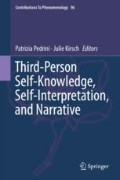Abstract
Our project is to answer questions that lead to a clearer picture of third-person self-knowledge, the self-interpretation it embeds, and its narrative structure. Bringing together current research on third-person self-knowledge and self-interpretation, our authors focus on third-person self-knowledge, and the role that narrative and interpretation play in acquiring it. We regard the third-personal epistemic approach to oneself as a problem worthy of investigation in its own right, and our contributors try to clarify the relation between third-person self-knowledge, self-interpretation, and narrative capacities. We also invite cooperation between analytic philosophy and phenomenology about issues regarding self-knowledge.
Authorship of this chapter is divided equally.
Access this chapter
Tax calculation will be finalised at checkout
Purchases are for personal use only
References
Bilgrami, A. 2006. Self-knowledge and resentment. Boston: Harvard University Press.
Boyle, M. 2015. Critical study: Cassam on self-knowledge for humans. European Journal of Philosophy 23 (2): 337–348.
Carruthers, P. 2009. How we know our own minds: The relationship between mindreading and metacognition. Behavioral and Brain Sciences 32: 1–18.
———. 2011. The opacity of mind: An integrative theory of self-knowledge. Oxford: Oxford University Press.
Cassam, Q. 2014. Self-knowledge for humans. Oxford: Oxford University Press.
Coliva, A. 2012a. In One variety of self-knowledge: Constitutivism as constructivism, ed. A. Coliva 2012b.
———., ed. 2012b. The self and self-knowledge. Oxford: Oxford University Press.
———. 2016. The varieties of self-knowledge. London: Palgrave Macmillan.
Dennett, D. 1987. The intentional stance. Cambridge, MA: MIT Press.
Dennett, D.C. 1991. Consciousness explained. Boston: Little, Brown and Company.
Gazzaniga, M. 1995a. Consciousness and the cerebral hemispheres. In, ed. M. Gazzaniga, vol. 1995b, 1391–1400.
———., ed. 1995b. The cognitive neurosciences. Cambridge: MIT Press.
Goldie, P. 2012. The mess inside. Narrative, emotion, and the mind. Oxford: Oxford University Press.
Gopnik, A. 1993. How we know our own minds: The illusion of first-person knowledge of intentionality. Behavioral and Brain Science XVI: 1–14.
Lawlor, K. 2009. Knowing what one wants. Philosophy and Phenomenological Research 79: 47–75.
Moran, R. 2001. Authority and estrangement: An essay on self-knowledge. Princeton: Princeton University Press.
Schechtman, M. 1996. The constitution of selves. Ithaca: Cornell University Press.
Author information
Authors and Affiliations
Corresponding author
Editor information
Editors and Affiliations
Rights and permissions
Copyright information
© 2018 Springer Nature Switzerland AG
About this chapter
Cite this chapter
Kirsch, J., Pedrini, P. (2018). Introduction: Getting to Know Our Own Minds. In: Pedrini, P., Kirsch, J. (eds) Third-Person Self-Knowledge, Self-Interpretation, and Narrative. Contributions To Phenomenology, vol 96. Springer, Cham. https://doi.org/10.1007/978-3-319-98646-3_1
Download citation
DOI: https://doi.org/10.1007/978-3-319-98646-3_1
Published:
Publisher Name: Springer, Cham
Print ISBN: 978-3-319-98644-9
Online ISBN: 978-3-319-98646-3
eBook Packages: Religion and PhilosophyPhilosophy and Religion (R0)

